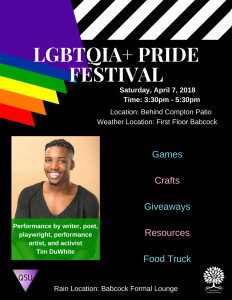Assignment Reminders:
Due Friday, April 6: Post a complete draft of your iMovie script/storyboard to Moodle by noon. Be sure to upload your document as a pdf. If you finish the draft and have questions for reviewers, include that information at the top of the script. Please be sure to post on time!
Due Monday, April 9: Review two of your peer’s scripts and post comments on each by noon.
Class Announcements:
- Sunday 7pm in Scheide: Pop Opera performance (25-30 min) Spoon is catering the reception afterwards
- Saturday 3:30-5:30: Pride Fest in Babcock formal lounge, there will be a food and performers
- WGSS Edit-a-thon next Thursday

Historical Question of the Day:
How do historians use popular culture and artistic production to better understand a political moment?
Presentations and Class Discussion:
Class began today with a Brazil history and culture blog presentation about soccer and politics. The presentation was based on an ESPN article which focused on the political implications for low numbers of Brazilian players on the 2018 World Cup team. This article brought up discussions in class on playing style, the use of sport as a tool for social and political control, modernization, money, and notoriety. Class continued with a presentation on Andrew J. Kirkendall’s book, Paulo Freire & the Cold War Politics of Literacy (Chapel Hill: UNC Press, 2010). The book, broadly speaking, is about how literacy was an important political issue during the Cold War. It focused on Paulo Freire’s role in literacy programs in Central America with themes on consciousness raising (the need to teach political awareness) and the influence of the Cold War. Professor Holt expanded on the presentation by introducing Freire’s work Pedagogy of the Oppressed. This opened up discussion on the idea that a student should have ownership of what they learn as a vehicle for empowerment and links from literacy to suffrage. For the rest of class, Marina presented her IS on women’s political activism and Brazilians’ political expression through gender. The presentation began with the 1964 Military Coup, focusing on civilian support by Catholic, white, and middle-class women who were charged with protecting the country’s morals and values. This theme of protection continues after the establishment of the regime and AI-5 in the creation of martyr (Edson Luis) and Mother Courage to facilitate maternalist arguments for political amnesty. The mentality here follows the logic of “my child could get swept up in this,” and creates a political image of a woman trying to save her country by saving her son. The argument is ultimately that these women, while political activists, were not feminist because of the emphasis on highly masculine qualities. This presentation led to a discussion on populism and anxiety about who is being represented in the political sphere.
Application of the Readings:
Marina’s presentation complemented the reading from the Brown online textbook on student movements. The Brown reading went into AI-5 and the establishment of the regime in 1986, providing a foundation for the student protests that was helpful for understanding the presentation. Marina expanded on the Brown reading, adding an example from the University of Brasilia, which was completely taken over with undercover soldiers planted in classrooms monitoring discussions and taking students who opposed the regime. In the Brazil history and culture blog, soccer was discussed as a political act. This connects to Dunn’s “The Tropicalist Movement” as it shows that not only music and art, but also sport can also be politicized. Expanding on the discussion of politicized acts, Dunn writes on the political implications of music written in and about struggles of urban citizens saying, “for artists and intellectuals situated on the periphery of global political and economic power, the dialectic between sense of place and cosmopolitan affinities is often simultaneously a source of anxiety and inspiration.” In Dunn’s chapter, it is clear that people absorb inspiration and motivations from their experiences, which appears, albeit sometimes subtly, in their work. Today’s class showed some of the different ways that politics enter other social and cultural spheres. As historians, this means we can (and should) question why and in what contexts artists produce their craft, and what implications those answers have for politics and culture.
Key Terms:
- “Samba Soccer” is a focus on the skills of individual players.
- Mysticism has a complicated definition, but broadly speaking refers to an experience of uniting with a divinity and can be spiritual and/or material.
- Another complicated concept, maternalism centers around the normative conception of women’s concern for children, motherhood, and morality.
Potential exam questions:
- How is “cannibalism” used as a political statement in Brazil? Consider Patricia Seed’s chapter “Cannibals: Iberia’s Partial Truth” and Christopher Dunn’s “The Tropicalist Moment” in your answer.
- Why do the class, race, and gender matter for the “face” of a social movement?
- What are the social and political implications of a Brazilian soccer team that is predominantly comprised of players from non-Brazilian leagues?
Additional Reading:
- This is an NPR article from the 2014 World Cup on the Germany v. Brazil game that was mentioned in class. It also includes some ties to political themes and actors. https://www.npr.org/sections/thetwo-way/2014/07/09/330089942/brazil-reels-from-thrashing-that-bounced-it-from-world-cup
- For coverage of the game that is a bit more raw, here are the goals. Watch at your own risk.https://www.youtube.com/watch?v=-sfRVyDHT30
- Below are two book reviews of Pedagogy of the Oppressed. For anyone interested in reading Freire directly, the book is available through the library. http://www.jstor.org/stable/3442883 ; http://www.jstor.org/stable/1187138
- There was a lecture series on mysticism this past fall at Wooster. Below is a pamphlet from the series and an interesting NYT article on mysticism and democratization in the United States. https://www.wooster.edu/_media/files/academics/areas/religious-studies/fallacademy.pdf ; https://www.nytimes.com/2010/03/08/opinion/08douthat.html
